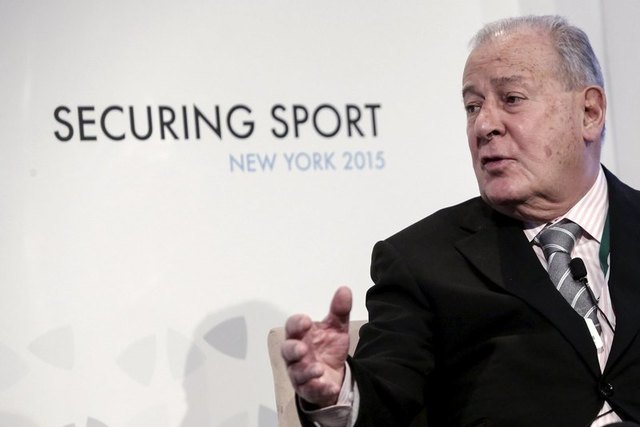By Paul Nicholson
November 3 – The chair FIFA’s reform committee Francois Carrard says that he does not believe FIFA is systemically corrupt and that he hopes he will have the opportunity to speak to all the presidential candidates before the elections in February.
Speaking publicly on FIFA’s reform process for the first time since he published his preliminary proposals at the end of October, he responded to suggestions that he was already part of the ‘club’ saying that sometimes you need to have an insider to make things happen.
“They wanted someone outside FIFA, I never had a job with FIFA. People say you must have outside advisors…but being some sort of insider I think is necessary.
Carrard said that the proposals of FIFA’s first attempt at reform via its Independent Governance Committee “were excellent but they didn’t get adopted.” He said that you need insiders to push them through, get them adopted and vote for them.
The arrests in Zurich in May of seven FIFA executives and the US indictment of these individuals and seven other football marketing executives triggered the current crisis, says Carrard who drew parallels to events in 1998 that lead to the reform of the IOC – a process Carrard led.
“The parallels to ’98 are that it was an unexpected event (the arrests in Zurich) that triggered the crisis and that there was immediate huge media interest and a reaction from sponsors. The IOC was 100 members and probably easier to implement the changes. Here there are 209 different national associations and different culture worldwide – the challenge is larger,” said Carrard.
That challenge has already lead to some confusion over who is leading the reform proposals with FIFA’s head of compliance Domenico Scala already having submitted a set of his own reform proposals that dig deeper and are more wide ranging than Carrard’s committee, so far. Carrard says his own proposals “triggered reactions that are important and very useful for the continuation of our work.”
Referring to Scala, Carrard said that “all his reforms are excellent – we agree but not on everything. For example Scala advocates a rotating presidency, but our feeling is that (the danger of) a rotating presidency (is that it) does not provide enough (time to develop effective) leadership.”
On his own committees reform proposals, he said: “I think there is a consensus on term of office – 12 years like the IOC but it is not finalised as whether it will be 3×4, 6+6 or 8+4. We are considering the consequences of a short term presidency. Worldwide it takes time to know the countries and the culture – this takes three or four years.”
Whether those term limits are widened to cover executive committee posts and national federations is undecided. “We have to think globally – Vietnam is not German Switzerland,” said Carrard.
But all are agreed, says Carrard, that there is an age limit “and that 74 is the cut off. This is all a work in progress.”
Asked about the levels of female representation within FIFA which a recent report described as under represented and under-resourced, Carrard said this was a complex issue.
“You could make that statement in many countries and about many institutions. It is a fundamental issue that we are absolutely committed to, but it is a challenge. We will have a specific recommendation on women which is a very difficult issue and has to be tackled day after day. FIFA currently has statutory provision for one female executive on its executive committee and our recommendation is to take this to six. We know it is not for reform. This has to be done everywhere,” he said.
Carrard also was given the opportunity to address his controversial comments made in August that football in the US was an ethnic sport and a sport for girls in High School. He explained that this was taken out of context and actually referred to his experiences in 1955 when he was a high school student in California when football was largely played by national groups from outside the US, and that soccer really began to develop through girls playing in High Schools. “I apologise for my statements that were not well understood. I never meant to say that.”
One aspect over which there is no confusion is the need for change. “We think change of culture is a fundamental issue and this has to come from the top down to enact these changes. There is a huge job to be done but it is essential,” he said. He has “found people totally committed and dedicated to reforms and also realistic about the job to be done”.
“FIFA has tried to reform and has made changes in the past, but people were not really understanding. If you are in the Baur au Lac hotel thinking about the day and getting ready for breakfast and suddenly the Swiss police knock on your door that changes perceptions and captures attention… I feel that there is a will (to bring reform) and if there is a will there is a way.”
The next step for Carrard’s committee is to present to FIFA’s next executive committee meeting on December 2 “a package of reforms structures ad statements that the Congress can adopt”.
Contact the writer of this story at moc.l1744411343labto1744411343ofdlr1744411343owedi1744411343sni@n1744411343osloh1744411343cin.l1744411343uap1744411343

